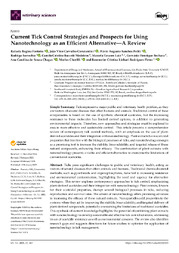 Busca de Publicações
Busca de Publicações
Current tick control strategies and prospects for using nanotechnology as an efficient alternative.
Summary: Ticks pose significant challenges to public and veterinary health, acting as vectors of several diseases that affect animals and humans. Traditional chemical control methods, such as pyrethroids and organophosphates, have led to increasing resistance and environmental contamination, highlighting the need and urgency for alternative strategies. This review explores contemporary approaches to tick control, emphasizing plant-derived acaricides and their integration with nanotechnology. Plant extracts, known for their acaricidal properties, disrupt several biological processes in ticks, reducing reproduction and survival rates. The advent of nanotechnology offers promising advances in increasing the efficacy of these natural extracts. Nanoparticles add properties to the systems where they act by improving the stability, bioavailability, and targeted delivery of plant-derived compounds, potentially overcoming the limitations of traditional acaricides. This synthesis of current knowledge highlights the potential of combining plant extracts with nanotechnology to develop sustainable and effective tick control solutions, addressing issues of acaricide resistance as well as environmental concerns. The review also identifies research gaps and suggests directions for future studies to optimize the application of nanotechnology in tick management.
Publication year: 2025
Types of publication: Journal article

